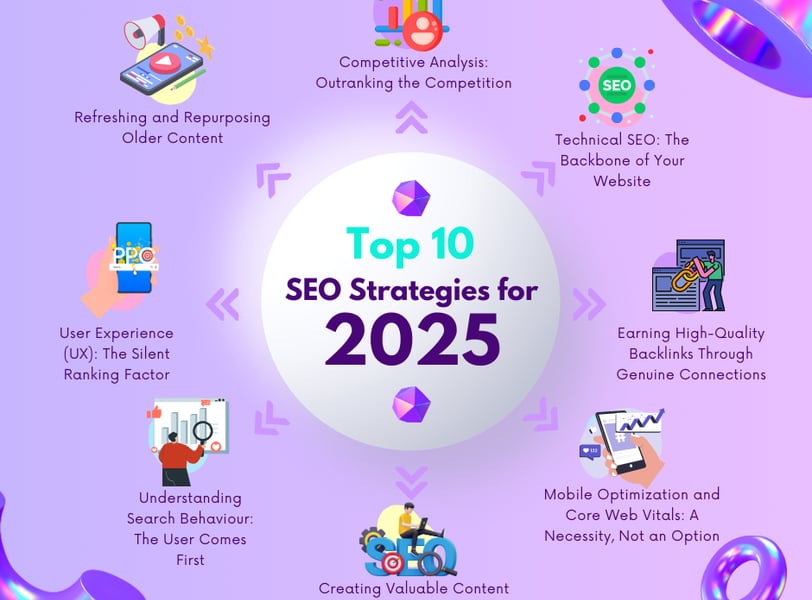SEO Strategy in 2025: What’s Killing Your Traffic?
Search engines have evolved—fast. From AI-driven search results to user-centric algorithms, the SEO landscape now demands strategy, substance, and speed. This blog dives deep into why your outdated tactics are failing and what it really takes to win in the SERPs this year. If you're ready to ditch the fluff and embrace data-driven, value-packed optimization, this one's for you.
SEO 2025
Lekha
4/16/20254 min read


Why Your SEO Strategy Won’t Work in 2025!
Anyone who has been long enough in the digital space very well knows that SEO is an ever-evolving game. What worked just a couple of months ago is now outdated. In 2025, the game has attained another level of complexity, or should we say, is further refined to take a user-centric approach. The days of keyword-stuffing and mass-produced backlinks are left behind with Adam. The current scenario demands strategic, high-quality, and experience-driven optimization. Based on my years of working with brands, content strategists, and data-backed research, here’s an in-depth look at how SEO works in 2025.
Understanding Search Behaviour: The User Comes First
SEO in 2025 revolves around mastering the understanding of user intent, at an advanced level. Search engines evolved to understand the intent of the search query and give their results accordingly. Unlike back in the days when results were provided solely based on the words typed into the search bar. Zero-click searches, AI-driven results, and voice searches now dictate content strategies.
For best-optimized search results, it's advisable to conduct deep audience research— Studying their problems, habits, and search patterns to align your content with what they’re actively looking for.
Creating Valuable Content That Stands Out
The algorithm doesn’t care about generic content at all. It only favors the original, well-researched, and engaging content. Articles with higher engagement, such as the ones that educate, solve problems, and retain user attention perform significantly better. Interactive elements, in-depth guides, and expert-backed information these days rank higher than ever.
Be the master of your niche. Right with authority. If your content is not adding value beyond what’s already available, rethink your strategy.
Mobile Optimization and Core Web Vitals: A Necessity, Not an Option
To get indexed in Google your site must be lightning-fast and optimized for various devices. Slow-loading pages, unresponsive layouts, intrusive pop-ups, and navigation issues are detrimental to the rankings. Be very mindful of the Core Web Vitals—page speed, interactivity, and visual stability are determining factors of the search rankings.
Use tools like Google’s Page Speed Insights, it’s very well aligned with the standards of Google.
It helps ensure that your website is mobile-friendly and fast. Use fewer plugins and take professional help wherever necessary.
Earning High-Quality Backlinks Through Genuine Connections
Link-building is more about credibility which people usually fail to understand and focus on the quantity of backlinks. Authoritative backlinks from trusted sources significantly boost the rankings. So, instead of spamming sites with backlink requests focus on relationship building and thought leadership.
Publish data-driven studies, collaborate with industry leaders, and create shareable content that naturally earns backlinks.
Technical SEO: The Backbone of Your Website
Technical SEO is very necessary, even the best content will fail to rank if technical SEO is weak. Search engines need to crawl, index, and understand your sites efficiently to further suggest them to the users. Structured data, schema markup, and optimized site architecture make your content more discoverable. Regularly audit your site for broken links, crawl errors, and duplicate content to keep it technically sound.
Competitive Analysis: Outranking the Competition
Always know what your competitors are doing and do it better. Use AI-powered tools to analyze gaps in their content strategies, backlink profiles, and keyword rankings, allowing you to capitalize on their weaknesses.
Always invest in SEO tools like SEMrush, Ahrefs, Ubersuggest, and Mangools.
Refreshing and Repurposing Older Content
In 2025, updating existing articles with new data, insights, and multimedia elements can be a very profitable venture. Google often rewards content repurposed into videos, podcasts, or infographics.
It is highly recommended to revisit your high-performing posts every six months to keep them current and competitive.
User Experience (UX): The Silent Ranking Factor
Search engines only rank websites that not just provide strategic content but also a seamless user experience. A site with intuitive navigation, accessible design, and engaging visuals holds visitors’ attention longer, reducing bounce rates.
Work on improving readability and ensuring smooth navigation for better UX. Also, take professional help for further enhancements.
Content Clustering: The New Way to Dominate Search Rankings
It’s worth knowing that Google prefers topic clusters rather than isolated topics. Organize your content well into categories, around pillar pages, and interlink relevant articles to create a structured web of information.
It also boosts credibility as well as your authority in your niche.
Tracking Metrics and Performance: Data-Driven SEO
Guessing in terms of traffic was never an option, in 2025 it's completely out of the question. To measure SEO effectiveness, one must always keep an eye on key metrics like organic traffic, dwell time, and click-through rate (CTR). Data analytic tools should be used to get real-time information on what’s working and what needs improvement. Regularly analyze Google Search Console and Google Analytics reports to adjust your strategy accordingly.
A/B Testing for Continuous Optimization
A/B testing helps determine what resonates best with your audience. Since SEO is not static, one can always experiment with different headings, meta descriptions, and call-to-action to improve rankings.
Run small-scale tests on landing pages and track performance before implementing large-scale changes.
Fixing Site Errors for Better Crawlability
Regular audits are to be conducted to check if there are no site issues like broken links, duplicate content, and improper redirects. If not fixed, these issues can hurt rankings. Keeping these issues in check ensures that search engines can efficiently crawl and index your site.
Use Screaming Frog or Google Search Console to identify and resolve errors.
Building Brand Authority and Trust: The Ultimate SEO Strategy
SEO in 2025, is more about cracking algorithms by trust building. Google ranks the content with higher trust in the source and such brands can establish themselves as industry leaders and enjoy long-term success.
Engage with your audience, showcase expertise, and be consistent in delivering value.
In 2025, SEO is more than just being visible, it’s about being useful. If you focus on creating authentic, value-driven content while keeping up with technical advancements, you’ll stay ahead in the rankings. The key to success is—Adaptability. SEO isn’t a one-time effort—It’s strategy strategy-building process that takes time, and a few trials and errors. We need to stay consistent and keep evolving.
Are you ready to refine your SEO strategy for 2025? Start by implementing these insights today and watch your rankings soar!
Know more about us
Your go-to for unique content solutions.
Services
© 2025. All rights reserved.
QUICK LINKS
View our Privacy Policy and Terms & Conditions.
